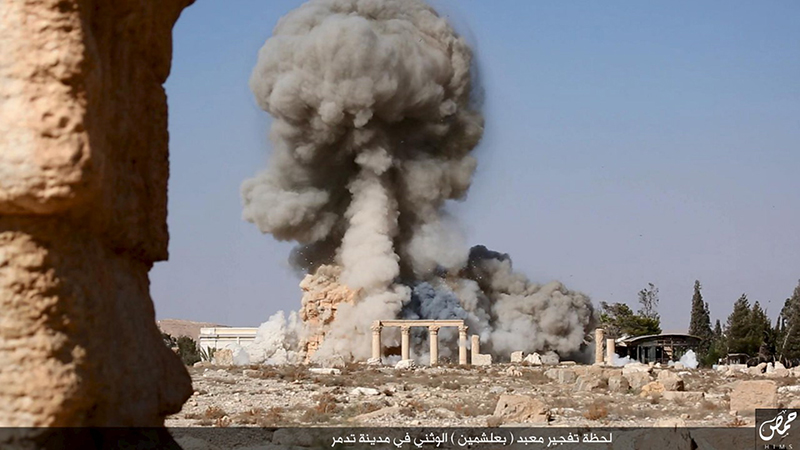The ‘Splainer is an occasional feature in which RNS staff offers facts and background on a religion-related event, person or group in the news.
(RNS) Many experts agree that terrorists in the group that calls itself the Islamic State believe they are waging an end-times battle against the West, and the Nov. 13 Paris attacks are just the latest chapter. What is the theological background of the group’s thinking, and why is it such an effective recruiting tool? Does its apocalyptic vision have roots in traditional Islam? How how can the West stop it?
Q: What is an apocalyptic belief?
A: It’s a belief that the world will end or be renewed, usually with catastrophic events or battles pitting the forces of good against evil. Apocalyptic views are found in Judaism, Christianity and Islam, while communism and Nazism are sometimes cited as secular examples.
Q: Why does it involve violence?
A: Apocalyptic believers desperately want to cleanse what they see as a corrupt and sinful world. While they are not all violent, the more imminent the apocalypse is believed to be, the more potential for destructive actions, says Richard Landes, the former head of the Center for Millennial Studies at Boston University. “Apocalyptic thought is unbelievably disruptive,” he says. The title of Robert Jay Lifton’s book about the Japanese cult Aum Shinrikyo, which hoped to provoke Armageddon with a 1995 nerve gas attack on a Tokyo subway, was: “Destroying the World to Save it.”
Video courtesy of Mike Grimm via YouTube, view more conference videos here.
Q: Which apocalyptic views are found in Islam?
A: The hadith — the Prophet Muhammad’s sayings as recounted by others — includes accounts of a final reckoning and a struggle between the forces of al-Dajjal, the Great Deceiver, and the Mahdi, a Muslim messiah (which in some interpretations is Jesus). The Quran itself does not mention these messianic figures but does emphasize a final reckoning between the righteous and the wicked.
Q: How has apocalypticism been viewed by Muslims traditionally?
A: Imam Sayyid M. Syeed of the Islamic Society of North America says Muhammad warned of the prospect of cataclysmic events, not because they would necessarily happen, but “for us to reform our society and make sure we don’t allow them to happen.” But many extreme jihadists believe they are in the midst of an apocalyptic struggle against Christians and Jews. And Landes says this view has been gaining ground, first among Shiite Muslims after the Islamic Revolution in Iran in 1979, and spreading to Sunni Muslims with the Palestinian intifadas and the 2003 U.S. invasion of Iraq.
Q: How does ISIS use apocalypticism?
A: Its name, for one. The “Islamic State” refers to the caliphate, a Muslim state headed by a kinglike caliph, which is what the group’s leader, Abu Bakr al-Baghdadi, calls himself. It has a magazine called Dabbiq, also the name of a northern Syrian town where one controversial hadith places the end-times battle.
William McCants, a Brookings Institution scholar and author of “The ISIS Apocalypse: The History, Strategy and Doomsday Vision of the Islamic State,” says the group’s end-times fixation distinguishes it from other groups, including al-Qaida, and is key to its relative success.
“They stir messianic fervor rather than suppress it,” McCants writes of ISIS. “They want God’s kingdom now rather than later. This is not Bin Laden’s jihad.”
Worse, he says, is that other groups, eyeing ISIS’ successes, may adopt their end-times focus. “My worry is we are in for some pretty dark days ahead.”
Video courtesy of Mike Grimm via YouTube, view more conference videos here.
Q: Why is it such a good recruiting tool for ISIS?
A: Many young people facing what they feel are dead-end lives find the idea of restoring Islam to its past glories irresistible. McCants has also said the lure of sex cannot be ruled out — ISIS promises young men who join its army concubines and wives. The power struggles in Syria, Egypt and other places in the Middle East may also be interpreted as the prophesied backdrop of Islam’s end-times scenario.
ISIS’ apocalyptic vision is “a big selling point with foreign fighters, who want to travel to the lands where the final battles of the apocalypse will take place,” McCants says. “The civil wars raging in those countries today lend credibility to the prophecies.”
Q: How should the West respond?
A: The West has a tradition of disregarding apocalyptic ideology, even on its own soil. Remember David Koresh and his Branch Davidians? Some scholars say that if law enforcement officials had taken their apocalyptic ideology seriously, the 1993 standoff in Waco, Texas, might not have ended with the deaths of 76 men, women and children.
Now, a growing number of scholars say ISIS’ apocalyptic vision is crucial to combating it. Alternative interpretations of Islamic ideology must be presented, by both Muslims and non-Muslims. Writing in The Atlantic last March, Graeme Wood said: “Muslims can reject the Islamic State; nearly all do. But pretending that it isn’t actually a religious, millenarian group, with theology that must be understood to be combatted, has already led the United States to underestimate it and back foolish schemes to counter it.”
YS/MG END SOCOLOVSKY/WINSTON
Video courtesy of Voice of America






